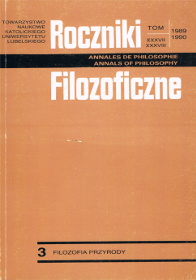Metaphysical Implications of Nature Mathematization
Abstract
The development, essence, progress and origin of modern experimental science are the Central and most widely discussed problems of philosophy and history of science. The article entitled "Metaphysical implications of mathematization of nature" is aimed to be a contribution to the ongoing discussion. It also attempts to suggest certain solutions to the problems. Basing on the novel interpretation of fundamental facts in the history of physics, the author wishes to determine the essence of physics on the one hand, and to point to the possible criteria of development of the science on the other.
When we consider the following facts from the history of physics: the rejection of the hypothesis of philogiston, the theory of ether and the elimination of all demonstrative concepts in favour of more abstract concepts, coupled with the progressive mathematization, we see that the essence of the science seems to lie in its mathematical character and its development is determined by the progressive mathematization of its objects. This viewpoint is confirmed by the analysis of the basic theories of present- day physics: the general and special theory of relativity, the theory of quantum mechanics and the theory of elementary particles.
Notice that the adoption of the thesis of the progressive methematization of nature implies another thesis, i.e. the process of mathematization is a realization of a more fundamental program of reducing the qualitative picture of the world to the abstract world of mathematical structures. This program seems to be nothing else than a reformulated Pythagorean- Platonic metaphysics. The history of physics seems to confirm the thesis of the metaphysical core of physics. At the same time, it becomes more logical and understandable. The shape and the content of the central theories of present-day physics supply the best examples of such a viewpoint.
Copyright (c) 1990 Roczniki Filozoficzne

This work is licensed under a Creative Commons Attribution-NonCommercial-NoDerivatives 4.0 International License.





